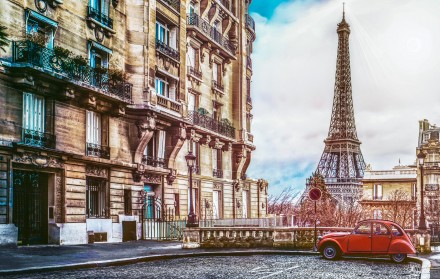In my capacity as a Photoshop expert, people ask me a lot of questions: “Where’s the bathroom?” “Do you work here?” and my favorite “Who is your supervisor?” But the most popular question of all is: “How do I turn a photograph into a piece of line art?” (like the one below). It seems people come across line drawings in, say, The Wall Street Journal or on Barnes & Noble bags and assume Photoshop deserves the credit. After all, these drawings are photo-realistic, and photo-realism means Photoshop.

Although Photoshop may play a hand in the refinement of the source photos and adjustment of the final art, the WSJ and B&N drawings are hand-drawn, each the product of an artist or engraver making the most of traditional tools and God-given talents.
But let’s say you want to achieve a similar effect without all that hard-wrought experience and manual labor. If you have $225 lying around, Andromeda Software (www.andromeda.com) sells a collection of filters called Artistic Screening Tools that let you create credible engraving effects. They’re great tools, and once upon a time, I would have said they were your only solution. My impression of other techniques was that they looked like what they were: cheesy Photoshop effects.
Thankfully, that’s a thing of the past. After a little critical analysis and a lot of creative soul searching, I came up with a slick trick that exploits Photoshop’s image enhancement and graphic arts functions. Plus, it relies on layers, so you can tweak your line drawing any old time you like. The result is a flexible—even fun—technique that lets you turn any photograph into a piece of high-contrast, photo-realistic art (as demonstrated below). Over the course of this two-part article (click here for Part 2), you’ll learn something those talented artists and engravers don’t know: How to create a hand-drawn effect in a fraction of the time in Photoshop.

Step one: Open a color photograph. Head shots work best because they usually provide subtle variations in highlight and shadow, volumetric contours, large areas of simple detail, and plain backgrounds. I chose for my subject the portrait of the sneering woman below from the iStockphoto library by photographer Joseph Jean Rolland Dubé (see below).

Step two: This particular line drawing technique marries a basic edge tracing with deep shadow blacks and cross-hatching. The Filter menu provides lots of ways to trace edges, but my favorite for this kind of work is Photocopy. For the most flexible results, we’ll apply Photocopy to an independent layer. Press Cmd-J (PC: Ctrl+J) to jump the image to a new layer. Press the D key to set the foreground and background colors to their defaults, black and white. Then choose Filter > Sketch > Photocopy. Set the Darkness value to its maximum, 50. Then raise the Detail value until you get nice thick edges, typically in the neighborhood of 9 for a 300 ppi image, as shown below.

Step three: To merge the lines with the original color image, choose the Multiply mode from the blend mode pop-up menu in the Layers palette. The filthy dirty result appears below.

Step four: Naturally, you don’t want our subject to look like she’s rubbed her face in graphite or succumbed to some dread 21st-century pandemic, so some cleanup is in order. We’ll start with the digital equivalent of a vacuum cleaner, then we’ll do some hand-scrubbing. Choose Filter > Blur > Gaussian Blur, enter a Radius of 2.0 (see below), and click OK. The result doesn’t look any better, but it gives you some gray values that you can trim away with the Levels command.

Step five: Choose Image > Adjust > Levels. Increase the first Input Levels value to punch the blacks (make them darker), and then decrease the third value to drop out the whites. I ended up setting the first and third Input Levels values to 115 and 140, as pictured below. Click OK to accept the change. The result is a much cleaner image, but not clean enough.

Step six: Use the lasso tool to select the stray dots and pock marks. Then either delete them or make them invisible with a layer mask. You can also use the eraser tool if you like. You should expect to spend 10 to 15 minutes on this step. Keep just the most obvious edge outlines, as I’ve done below.

Step seven: For reasons that will become increasingly evident as you work through the steps, you need to keep the original image around for Photoshop to reference. But as it stands now, it competes rather fiercely with the black outlines. To lessen its impact, click the Background layer and make a new layer. Press Cmd-D (PC: Ctrl+D) to deselect the image. Then press Cmd-Delete (PC: Alt+Backspace) to fill the entire layer with white, as witnessed below. Reduce the Opacity value in the Layers palette to 50 percent to let some of the original image show through.

Step eight: Now to fill in the shadows with black. You might think this requires painting or selecting, but it doesn’t. The approach is a bit more technical, but it’s also vastly more automated. Create another new layer and this time fill it with black by pressing Option-Delete (Alt+Backspace). Double-click to the right of the black layer’s name in the Layers palette to display the Layer Style dialog box. Go down to the last slider bar, which is labeled Underlying Layer. Drag the white triangle to the left to force through the lightest colors in the underlying layers. I dragged my triangle until the right-hand value above the slider read 160, meaning that the black covers brightness levels of 160 and darker. The result appears below. That’s all there is to it; click OK to exit the dialog box.

At this point, we have something that vaguely resembles a line drawing traced in velum over a photograph. The effect is okay, but to my eyes, it still looks too much like Photoshop art. In Part 2 of this article, I’ll show you how to bring in the cross-hatching that sells the effect as a mechanical engraving (see the comparison below). Prepare to be rather amazed when you see how you can adjust the coverage of the cross-hatching on-the-fly and add pattern layers as you see fit. For novices and advanced users alike, it really is a wonder to behold.




I am constantly being amazed
I am constantly being amazed and energized by something new learned!
Looking for a Video
Deke (and various Sidekicks, collaborators, conspirators, whomever)
Three nights ago I was in the middle of watching one of your many excellent videos then, I was called into another room because a medical emergency. I can not relocate this video; the model resembles Liv Tyler and there were white orchids by her face. Deke had previously spent considerable time outlining with the Paintbrush and continued by demonstrating the new Rotate Tool explaining that it is particularly handy for lefthanded artists. I believe there were also masking/blending demonstrations as well. If you have a spare moment and you’re not scratching yor butts (a reference to deke’s comment on heavy work load at the end of the CS4 Chanennels and Masks project), please guide me this very interesting video. Oh, ... don’t forget to wash your hands!
Eric
where is Creating a Photo-Realistic Line Drawing, Part 2
Thankyou for the part-1. But when i click on part-2 link “page not found “message appears. How do i complete the tutorial?
I fixed the link
Above, or you can click this link for Photo-Realistic Line Art, Part 2.
creating a photo-realistc line drawing
great tutorial, where can i buy this tutorial.
Thank you,
al1936
I’ll probably make it part
Of my Blend Mode series, which I’ll record for lynda.com in September.
Creating a Photo-Realistic Line Drawing
Hi Deke,
Thanks for all the sterling work you have done!
Can you please tell me if you did video for this on Lynda. com, and where I can find it. I am a subscriber to Lynda,
Thanking you in anticipation,
Best wishes
pete
I don’t think I have
But I will!
And in the meantime, it’s part of my Adobe Photoshop CS5 One-on-One book.
gracias
gracias
thanks
thanks for the tips. It was worth signing up :)
Maryline
It’s a high-quality
It’s a high-quality summary that you have written. There are a number of points however which I believe would do better if you went into a little bit further detail than you have done. simply my opinion,plus I’m not trying to be critical at all. If you do follow this up then I would be interested. Thanks.bridal photography CT
So much like the old day quality.
Deke I have been looking for years for a process that made a high contrast image close in quality to the ones I made for 20 years in the darkroom with ortho-litho film.
This technique seems to be very close to the ortho-litho film technique and just about as time consuming. LOL.
Thanks for the tutorial!
Jim Crabtree
CrabtreePhoto.Com
Thanks for your lovely work!
Thanks for your lovely work!